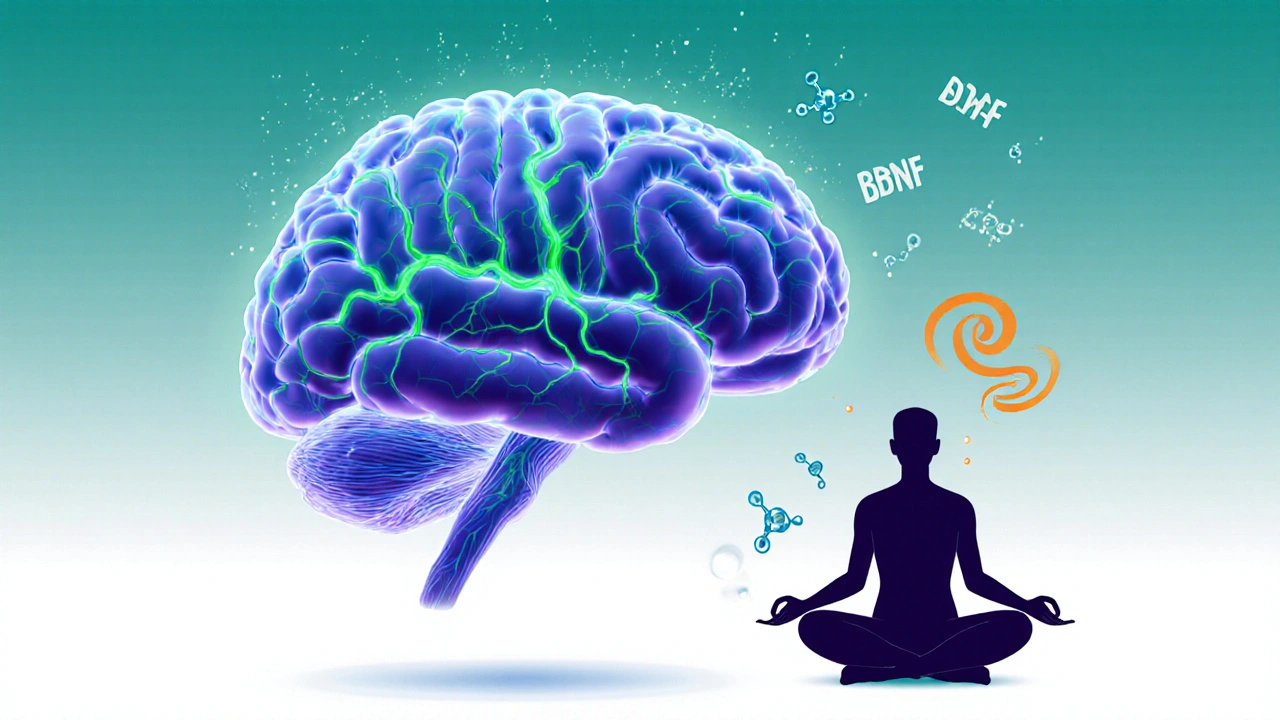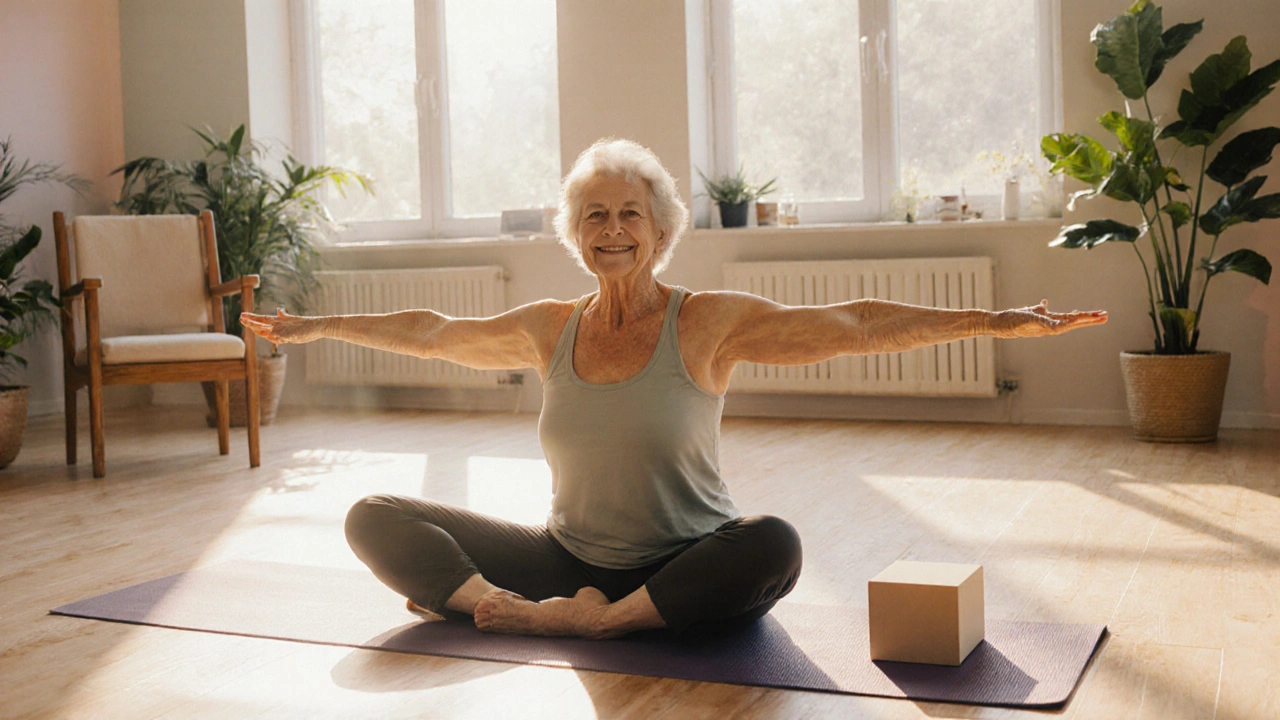MS Symptom Relief Tracker
Track Your Daily Symptoms
Rate your symptoms on a scale of 1-10 (1 = worst, 10 = best) to see trends over time.
Yoga & Mindfulness Benefits Calculator
Estimate potential improvements in your symptoms with regular practice.
Your Results
Track your symptoms or calculate potential benefits to see results here.
Key Takeaways
- Regular Yoga for multiple sclerosis can improve balance, flexibility and reduce spasticity.
- Mindfulness meditation lowers stress hormones and eases anxiety common in MS.
- Both practices stimulate neuroplasticity, helping the brain compensate for nerve damage.
- Start with gentle classes, use props, and listen to your body to stay safe.
- Clinical trials show measurable improvements in fatigue, pain and quality of life.
Why Sclerosis Patients Look Beyond Medication
Living with multiple sclerosis (MS) means coping with fatigue, muscle stiffness, unpredictable pain and emotional ups‑and‑downs. While disease‑modifying drugs slow progression, many patients ask, “What can I do daily to feel better right now?” The answer often lies in mind‑body practices that empower the nervous system without added chemicals.
What Is Yoga and How It Relates to MS
Yoga is a system of postures, breath work and meditation that aims to balance body and mind. Originating in ancient India, modern yoga classes range from vigorous power sessions to slow, therapeutic flows.
For someone with MS, the gentle stretch‑and‑hold format targets three core challenges:
- Balance and coordination - Standing poses with support improve proprioception, reducing fall risk.
- Spasticity - Lengthening the muscles through safe, supported stretches can calm involuntary contractions.
- Fatigue management - Controlled breathing (pranayama) increases oxygen uptake without overexertion.
Mindfulness: Training the Brain to Stay Calm
Mindfulness is a mental practice that involves paying non‑judgmental attention to the present moment, often using breath or body sensations as anchors. It is the backbone of programs like Mindfulness‑Based Stress Reduction (MBSR).
People with MS frequently report heightened anxiety about symptom flare‑ups. Mindfulness counters this by lowering cortisol, the stress hormone that can worsen inflammation.

Scientific Links: Neuroplasticity, Inflammation and Stress
Neuroplasticity is a brain’s ability to reorganize neural pathways in response to new experiences. Yoga and mindfulness create the “new experiences” that drive this rewiring.
Studies from 2023‑2024 using functional MRI show increased connectivity in the motor cortex of MS patients after 12 weeks of yoga‑based exercise. The same research reports higher levels of brain‑derived neurotrophic factor (BDNF), a protein that supports neuron survival.
Inflammation is a immune response that, when chronic, damages myelin sheaths around nerves in MS. Both gentle movement and focused breathing have been shown to shift cytokine profiles toward anti‑inflammatory patterns.
Mindfulness directly reduces perceived stress, which in turn lowers circulating interleukin‑6 (IL‑6) and tumor necrosis factor‑alpha (TNF‑α), two markers linked to MS relapses.
Evidence from Clinical Trials
Clinical study is a research investigation that evaluates the safety and effectiveness of an intervention in human participants. Several recent trials focus on yoga and mindfulness for MS.
| Trial | Duration | Primary Outcome | Result |
|---|---|---|---|
| University of Toronto, 2023 | 12 weeks | Timed Up‑and‑Go (mobility) | Improved by 22% |
| Berlin MS Center, 2024 | 8 weeks | Fatigue Severity Scale | Decrease of 3.5 points |
| Harvard MBSR trial, 2022 | 10 weeks | Perceived Stress Scale | Drop of 6.2 points |
These numbers may look small, but they translate into real‑world gains: fewer falls, longer activity periods and a calmer outlook during flare‑ups.
Getting Started: A Simple 4‑Week Plan
Below is a practical roadmap that anyone can adapt, whether you’re a beginner or returning after a break.
- Week1 - Breath & Awareness: 10minutes of seated breathing (inhale 4‑sec, hold 2‑sec, exhale 6‑sec) followed by a 5‑minute body‑scan meditation.
- Week2 - Gentle Flow: Attend a “MS‑friendly” yoga class or follow an online video that emphasizes seated poses, cat‑cow stretches, and supported warriorII. Keep sessions under 30minutes.
- Week3 - Balance Integration: Add standing poses with a chair or wall for support (tree pose, heel‑to‑toe walk). Pair each pose with a mindful breath count.
- Week4 - Mindful Movement: Combine the flow with a 5‑minute gratitude meditation at the end. Track how you feel on a simple scale (1‑10) for fatigue, pain and mood.
Consistency beats intensity. If a day feels rough, simply repeat the previous week’s routine.
Safety First: Tips to Avoid Injury
- Talk to your neurologist before beginning any new exercise program.
- Use props-blocks, straps, chairs-to keep joints safe.
- Listen to heat signals; avoid hot yoga rooms if you have temperature‑sensitivity.
- Stop immediately if you feel dizziness, numbness or sharp pain.
- Stay hydrated and practice on a non‑slippery surface.
Beyond the Mat: Lifestyle Synergy
Yoga and mindfulness work best when woven into a broader wellness plan. Pair them with a balanced diet rich in omega‑3 fatty acids, regular sleep hygiene, and, of course, adherence to prescribed disease‑modifying therapies.

Frequently Asked Questions
Can yoga replace my MS medication?
No. Yoga is a complementary practice that can lessen symptoms and improve quality of life, but it does not alter the disease course in place of disease‑modifying drugs.
How often should I practice?
Aim for 3‑4 sessions a week, each lasting 20‑30 minutes. Short daily mindfulness drills (5‑10 minutes) are also very effective.
Is hot yoga safe for MS?
Most people with MS are heat‑sensitive, so hot environments can trigger a temporary worsening of symptoms. Stick to warm‑room or room‑temperature classes.
Do I need special equipment?
A yoga mat, a sturdy chair or wall for support, and optional blocks or straps are enough. Many online videos demonstrate prop‑free modifications.
Will mindfulness help my chronic pain?
Yes. Mindful awareness changes the brain’s pain‑processing pathways, often reducing the intensity of chronic pain by 20‑30% in controlled studies.


Rhonda Adams
Keep breathing and stay present, you’ve got this! 😊